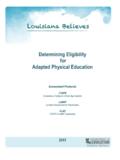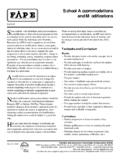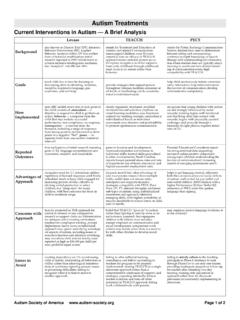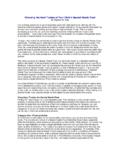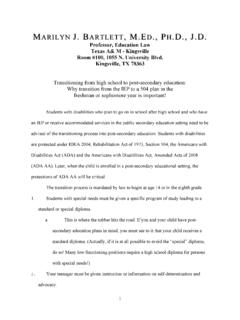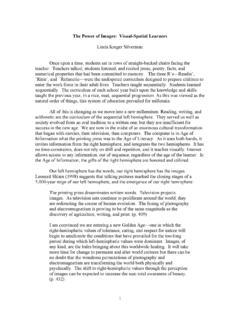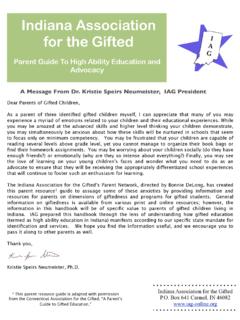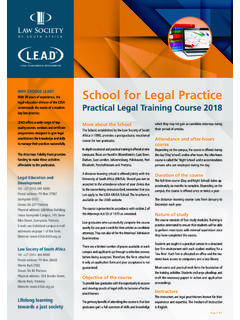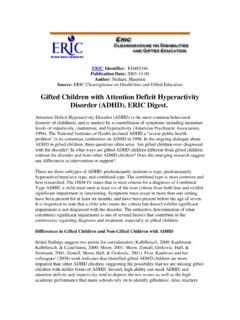Transcription of Twice Exceptional Students - Wrightslaw
1 A Guidebook forTwice Exceptional StudentsSupporting the Achievement of GiftedStudents with Special NeedsMONTGOMERY COUNTY PUBLIC SCHOOLSFor more information, contactMarisa Stemple, GT/LD Instructional Specialist,Division of Enriched and Innovative InstructionE-mail: document is available in an alternate format, upon request,under the Americans with Disabilities Act, by contacting the Departmentof Communications, 850 Hungerford Drive, Rockville, Maryland 20850-1744,301-279-3391 and TDD at who need accommodations, including sign language interpretation orother special assistance, in communicating with the Montgomery County PublicSchools may contact the Family and Community Partnerships Unit at301-279-3100 and TDD at 301-279-3323, or at the address accordance with relevant laws and regulations.
2 The Montgomery County PublicSchools prohibits discrimination on the basis of race, color, national origin,marital status, religion, sex, age, disability, or sexual orientation in employment orin any of its education programs and activities. Make inquiries or complaintsconcerning discrimination to 301-279-3100 and TDD at 301-279-3323,or write to the address below:Montgomer y County Public SchoolsFamily and Community Partnerships Unit451 Hungerford Drive, Suite 508 Rockville, Maryland 20850 MCPSM ontgomer y County Public SchoolsRockville, Mar ylandPublished by the Department of Curriculum and InstructionProduced by the Office of Strategic Technologies and ELECTRONIC GRAPHICS & PUBLISHING SERVICES 07/04 800 MCPSM ontgomery County Public SchoolsDepartment of Curriculum and Instruction850 Hungerford DriveRockville, MarylandA Guidebook forTwice Exceptional StudentsSupporting the Achievement ofGifted Students with Special NeedsCONTENTSA.
3 Policy ..A-1B. Introduction .. B-1C. Population .. C-1D. Identifi cation ..D-1E. Characteristics .. E-1F. Framework for Success .. F-1 Strength-based Instruction .. F-1 Goals .. F-1 Best Practices .. F-2G. Adaptations and Accommodations ..G-1 Defi nitions ..G-1 Guiding Principles ..G-2H. Interventions .. H-1 Overcoming Obstacles Related to Writing .. H-1 Overcoming Obstacles Related to Organization .. H-2 Overcoming Obstacles Related to Reading.
4 H-2 Overcoming Obstacles Related to Memory .. H-3I. What Works/What Doesn t Work .. I-1 School Climate .. I-1 Instructional Skills and Strategies .. I-1 Content Areas .. I-2 Evaluation/Assessment .. I-3 What Works Charts .. I-4J. Staff Development .. J-1K. Programs and Services .. K-1 Service Model Components .. K-1 Program Features .. K-1L. Who s Who Roles and Responsibilities in MCPS .. L-1M. Conclusion .. M-1N. Resources .. N-1O. Acknowledgments.
5 O-1P. Bibliography .. P-1 Twice Exceptional Students Policy A-1 POLICYThe state of Maryland has adopted into law and the Montgomery County Public Schools (MCPS) Board of Education has adopted into its policy the key concepts of the defi nition of gifted and talented Students originally stated in the Jacob K. Javits Gifted and Talented Students Education Act (1988).Gifted and talented Students are defi ned as:..children and youth with outstanding talent (who) perform or show the potential for performing at remarkably high levels of accomplishment when compared with others of their age, experience, or require services or activities not ordinarily provided by the talents are present in children and youth from all cultural groups, across all economic strata, and in all areas of human Maryland State Department of Education s (MSDE)
6 Local Planning Team Handbook in the creation of each school system s master plan, calls for assisting schools in the identifi cation of, and provision of services to, gifted and talented Students (including economically disadvantaged Students , English lan-guage learners, and Students with disabilities). MCPS Board policy states that underachieving and traditionally underserved Students will be nurtured through a variety of efforts characteristics of gifted/learning disabled and/or underrepresented groups and adaptive techniques that assist these Students in mastering challenging instruction.
7 This guidebook meets that requirement of the state and county policy. It does so with the goal of help-ing to increase the number of Students realizing their true Exceptional Students Introduction B-1 INTRODUCTIOND iamonds are rare. Two hundred fi fty tons of rock, sand, and gravel must be processed to yield one carat of polished diamond. The diamonds we will be discussing in this guidebook also are rare. They are often not identifi ed because their brilliance and roughness may mask one another and we see only the rough parts their inability to write or read effectively resulting in an attitude of discouragement and defeat.
8 When we do fi nd these diamonds, not only do we help them to reach their potential, we identify the gifts and talents that will benefi t our entire purpose of The GT/LD Guidebook Supporting the Achievement of Gifted Students with Special Needs is to assist staff, parents, and the Students in understanding the identifi ca-tion process and in accessing appropriate instruction. As directed by Maryland law and by MCPS GT policy 10A, we must identify and serve not only the Students who perform, but also the Students who show the potential for performing at high levels ..and these talents are present in children and youth from all cultural groups, across all economic We must also be aware that these talents are present in a diverse group of Students .
9 Although much of this guidebook focuses on the identifi cation and appropriate education of Students who are gifted and simultaneously have learning disabilities (GT/LD), much of what is stated on the following pages will serve to help in the identifi cation and appropriate programming for all gifted, underachieving Students as well as to help other Students reach their true potential. Many of the suggested teaching practices and strategies included in the guidebook have been found to be effective with all Exceptional Students Population C-1 POPULATIONS tudents who are GT/LD are those who are considered gifted, have a learning disability as defi ned by IDEA, and require special education services in order to receive educa-tional benefi student is gifted if he/she: possesses outstanding abilities in the areas of general intellectual capabilities, specifi c academic aptitudes or the arts.
10 Jacob K. Javits Gifted and Talented Students Education Act (1988)Defi nition of a specifi c learning disability (SLD):A. SLD means a disorder in one or more of the basic psychological processes involved in understanding or in using language, spoken or written, that may mani-fest itself in an imperfect ability to listen, think, speak, read, write, spell, or to do mathematical SLD includes conditions such as perceptual disabili-ties, brain injury, minimal brain dysfunction, dyslexia, and developmental SLD does not include Students who have learning problems which are primarily the result of visual, hearing, or motor impairments, mental retardation, emotional disturbance, or environmental, cultural.
